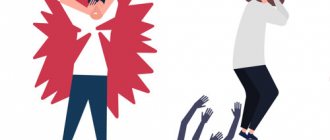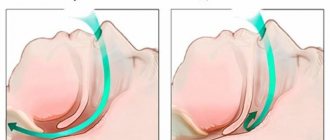Nocturnal panic attacks, sometimes called “nighttime panic attacks,” can occur either during sleep or while trying to fall asleep. They are characterized by a sudden onset of fear, and usually lead to a variety of unpleasant physical symptoms. These may include:
- Cold sweat
- Cardiopalmus
- Hyperventilation and shortness of breath
- Fluctuations in body temperature (fever or chills)
- Chest pain
- A depressing feeling of doom
Panic attacks usually don't last more than 10 minutes, but the effects (which can be emotional, physical, and cognitive) can last a long time.
Why do panic attacks happen at night?
At night, we are left alone with our fears. It is easier to escape from worries and unpleasant thoughts during the day than at night. If a person is prone to anxiety and has a number of accumulated problems, or is experiencing stress, then the likelihood of nighttime panic attacks increases.
In this state, our brain is in “defense mode,” constantly monitoring for threats, including any changes it senses in the body. So if you go to bed feeling tense, when your body begins to relax, it may perceive it as something dangerous and trigger a stress response. Panic attacks are your body's way of protecting you.
What is a panic attack?
A panic attack is a disease characterized by pronounced
panic attack, anxiety, fear, various somatic, autonomic disorders (psychosomatics), associated with a violation of autonomic nervous regulation in the body. Synonyms for the term “ panic attacks ” are “ panic ”, “ panic disorder ”, “sympathoadrenal crisis”, “NCD”, “cardioneurosis”, “cardio neurosis”, “cardiac neurosis”, “paroxysms”, “neurocirculatory dystonia”, “ neurocirculatory dystonia”, “vegetative crisis”, “panic attack syndrome”, “vsd”, “mental attack”. Unfortunately, this disease occurs very often in men and women, according to sarcastic clinics, the frequency of occurrence in the population of panic disorders.
Nightmares
Panic attacks that occur during sleep are usually caused by nightmares. Nightmares are considered a form of sleep disorder that affects the nervous system, causing unusual behavior.
Nightmare
Nightmares are episodes of intense fear during sleep, usually occurring in the first third of the night. You may wake up terrified with a frantic intensity of physical symptoms that trigger a panic attack.
Main signs of panic disorder
- Repeated attacks of panic attacks
are
sudden episodes of severe anxiety, episodes of inexplicable intense fear
(for example,
fear of death, fear of going crazy, fear of losing control of oneself,
and others).
Panic attacks
typically have
an unexpected onset
- without warning signs or apparent cause.
Specific fears
(
heart attack, stroke, fainting,
etc.), they force the patient to constantly measure his pulse, blood pressure, and do repeated electrocardiograms.
Panic attacks do not pose a threat to human life or health
, but they are a frightening condition in which
a person cannot control his feelings and emotions
and becomes completely defenseless. - Autonomic symptoms
developing suddenly and reaching their peak within the first 10 minutes: pulsations, palpitations, rapid pulse; - sweating;
- chills, tremors;
- feeling of lack of air, shortness of breath;
- difficulty breathing, suffocation;
- pain or discomfort in the left side of the chest;
- nausea or abdominal discomfort;
- dizziness, unsteadiness;
- weakness, lightheadedness, faintness;
- numbness or tingling sensation (paresthesia);
- waves of heat and cold;
- insomnia;
- feeling of derealization, depersonalization.
(in 60-80% of patients with panic attacks), which are caused by
pathological anxiety
.
There is also a clear relationship between the severity of the disease and concomitant sleep disorders. Patients with panic disorder complain of difficulty falling asleep
,
unrestoring sleep
, and characteristic
nocturnal panic attacks
.
In only 25% of patients, panic attacks occur exclusively while awake. Most patients experience an attack at some time during nighttime sleep, and 30-45% of them experience repeated episodes. 21% of patients experience sleep panic attacks, and in 54% panic attacks occur both during wakefulness and sleep. Nocturnal panic attacks
are manifested
by sudden awakening
(waking up from the feeling of being unable to inhale or exhale, forcing the patient to jump out of bed, open the window, lean his hands on the windowsill to use the accessory respiratory muscles; often experiencing dizziness and cramping of the fingers), all the symptoms characteristic of panic attacks .
There is a delay in bedtime, frequent awakenings, and a reduction in total sleep duration. Patients, fearing a recurrence of night panics, deliberately deprive themselves of sleep
, exacerbating the already pronounced insomnia symptoms, which leads to more serious disorders and generally
reduces the quality of life
of these patients.
What to do when attacks occur before bed?
As mentioned above, at night we often begin to process all the stresses of the day or worry about the day ahead. Panic attacks before bedtime usually occur during stressful moments in life, when our head is filled with problems. Maybe these are quarrels in relationships, conflicts at work, a period of painful changes.
After we've had a panic attack, worrying about it happening again can create a vicious cycle in which we become afraid to fall asleep. Although this type of reaction is considered normal, it often causes even more concern.
What to do if you have a panic attack at night
If you are having a panic attack, experts advise taking the following steps:
- Close your eyes and inhale slowly and deeply through your nose.
- Then exhale slowly and deeply through your mouth.
- If you can, continue this process as long as it lasts, counting 1 - 5 on each inhalation and exhalation.
Try to accept that you are experiencing a panic attack without any resistance. When we try to fight anxiety, we only make it worse. It can be scary, but try to move towards the anxiety rather than away from it.
Panic attack
Once you feel better, the worst is over. Just remember – your body is on high alert right now, so it will likely take some time to calm down again. So sleep is out of the question for a while.
What to do if you have a panic attack?
Breathing exercises. Before a panic attack and at the moment of its onset, a person usually breathes with difficulty, is afraid of suffocating and begins to fill his lungs with short, shallow breaths. The lungs are not completely emptied, which can lead to hyperventilation and, as a result, a panic attack. It is necessary to act differently. When you feel the first signs of panic, exhale very deeply and begin to breathe only through your nose - slowly, controlling your breathing so that your stomach rises and falls in time with your breathing, and your chest remains motionless.
Relieving body tension. If the body is too tense, the best way is to create more tension. This is done sharply: squeeze into a ball, hold your breath and bring the tension to a peak state. Then just as quickly release the tension, straighten your body, tilt your head to the side and relax your lower jaw without opening your mouth. After this, start breathing deeply. At the same time, inhale the air very slowly and slowly pronounce the word “I” to yourself, and as you exhale, the word “sleep.”
Removing tremor. If your limbs are shaking, use the “mad dance” technique. Try to push the tremor to the limit by shaking and vibrating with maximum amplitude. You can add a voice, and if you want to cry, cry. Keep only one thought in your head - that as soon as the mad dancing ends, sleep will come. At the same time, you need to stop the “mad dance” spontaneously.
Get rid of obsessive thoughts from your head. If anxiety is accompanied by a swarm of obsessive thoughts, extraneous sounds will help cope with them. Close your eyes and explore the space around you, find and count sounds. The more sounds that are detected and realized, the higher the likelihood of sleep returning.
And finally, you shouldn’t focus throughout the day on thoughts that when night falls you won’t be able to fall asleep again. Don’t stress yourself out and drive away negative moods.
We hope that the above advice from a psychologist will help you overcome panic attacks and return to restful and deep sleep. However, we repeat that to determine the root causes of conditions such as fatigue, weakness, anxiety, bad mood and insomnia, it is better to seek qualified help. Specialists at the Center for Harmony of Soul and Body “Here and Now” have been working successfully with similar psychosomatic disorders for a long time. We will be glad to see you and will make every effort to return harmony and tranquility to your life.
Tips on what to do after an attack
- Go to the bathroom and splash some cold water on your face. The cold causes a shock in the system, which prompts the body to go into survival mode, ultimately lowering the heart rate.
- Then try to find a simple activity that will calm you down. Wash the dishes, sweep the floor, clean out the refrigerator. Whatever you choose, do it in such a boring and mundane way that it requires minimal mental effort. Remember, you are not trying to distract yourself here, you are just doing normal, run-of-the-mill activities while your symptoms begin to subside.
- If you wake up sweaty, take a warm shower, put new sheets on your bed, and put on your comfiest pajamas. Having removed the physical evidence of a panic attack, we will start over and return to sleep as quickly as possible.
- Gradually you will begin to feel your body begin to relax. Return to bed only when you are ready. If it's not time yet, try meditating or taking a few deep breaths until your body begins to calm down again.
Remember the main thing, no matter how terrible panic attacks are, they cannot cause us physical harm.
How to stop nighttime panic attacks
Talking to a therapist can help you address the root of your anxiety and find tools to create real, lasting, positive changes in your life. At the same time, performing nightly exercise can help create a nurturing environment for your body to naturally calm down and prepare you for sleep.
- Try talking to your partner, family member or friend about what's bothering you. Take a bath or warm shower before bed. The heat will help relax your muscles and body.
- Keep a pen and paper handy. If you start to worry about things or tasks, write them down (or add them to a list on your phone). Worrying at night when you can't do anything about them is useless. Once you write it down, you can return to it at a more convenient time.
- Eliminate alcohol from your life for a while. While alcohol can temporarily numb our worries, it is also a serious stimulant for anxiety. The same goes for caffeine. Make sure you don't drink tea or coffee after 6pm.
- Be active. Never forget the importance of exercise.
- The next time you're trying to sleep, try taking your mind off the dream and focusing it on your physical sensations instead. Think about how good it feels to be in bed.
- When negative thoughts arise, imagine locking them in a small box and throwing away the key. Remind yourself: now is not the best time to think about it.
- Set yourself a designated “worry time.” It's half an hour of the day where you allow yourself to worry about as many things as you want. When you start worrying outside of these times, remind yourself so you can forget about it until next time.
- If you have trouble falling asleep for a long time, get out of bed and do something until you start to feel sleepy again. Your bed should be your sanctuary for sleep and it is important that you do not start associating it with any anxious, sleepless nights.
- Some people find that certain foods can cause anxiety. The next time you have a panic attack at night, try writing down what you ate before bed. And as soon as you make a list, start removing these products one by one until the panic attacks stop.
If you suffer from panic attacks, then your anxiety level is very high. Please remember: You do not have to go through this alone. Seek support if panic attacks begin to interfere with your ability to enjoy everyday life.









